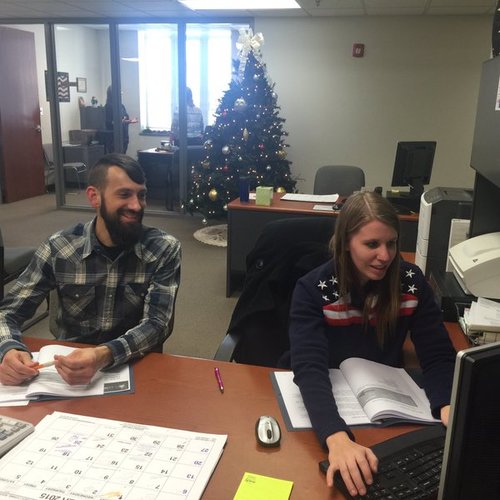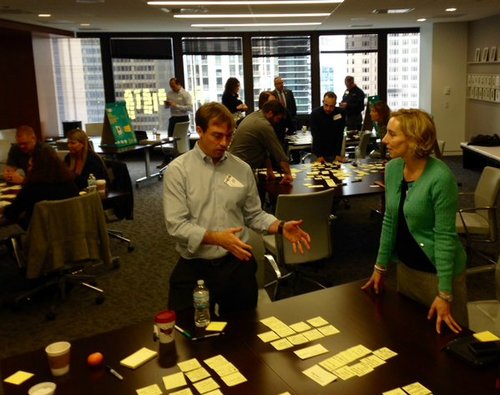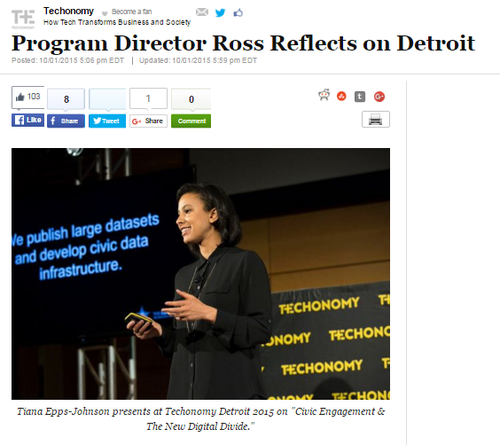Looking Back, Looking Forward
2015 was the Center for Technology and Civic Life’s first full year in operation, and although we’re still a young organization, we’re proud of the progress we’ve made toward our mission of modernizing civic engagement between local government and the people they serve. And in these first few weeks of the New Year, we’re even more excited about what the future has to bring. In this update, we’re taking a moment to look back on our accomplishments and to share our plans for the year ahead.
Our first year
Founded in the fall of 2014, CTCL set up an office in Chicago in the early weeks of 2015, at the height of a harsh winter in the Windy City. With the support of Smart Chicago, we got settled into our new city by first setting up shop in a coworking community located in Chicago’s famous Merchandise Mart. After a few months, we established a more permanent office at WeWork Fulton Market, a coworking space in the West Loop area.
Election Website Template & Training
Right out of the gate we worked to create some signature tech tools for local election officials. Based on a listening tour in which we traveled around the country and asked local election officials what kind of technology they needed the most in their offices, we established a straightforward, elegant, and affordable election website template and created a training program to help jurisdictions build a new site and get it off the ground. This work benefited from great partnerships, including the Center for Civic Design and the Knight Prototype Fund.
Throughout the year we were on the road connecting with local election officials near and far. We spoke at conferences in states including New Jersey, Virginia, and Missouri. And we hosted webinars on the topic of publishing civic information online. All told, we led skill-building workshops at conferences with some 300 people. To help election officials understand where their current communication efforts may be falling short, we offered to perform detailed assessments of their current election websites. We received over 45 requests for assessments.
We also worked to call attention to an even bigger problem: the number of local election authorities that have no website at all. Doing detailed research on the presence of election websites in Illinois and Missouri, we discovered that many counties in both states have no website: 32% of counties in Illinois and 45% in Missouri. Our findings are consistent with the research published by Cyd Harrell and the Center for Civic Design in 2013 that found nearly one third of U.S. counties lacked an election website.

Today there are 10 jurisdictions using our website template, and there are others who will be joining them as election offices gear up for the 2016 elections. Several trainings are already scheduled, and we look forward to working with even more election officials in the coming months.
Civic Engagement Toolkit
2015 saw the debut of another exciting project, as well: the Election Toolkit. Along with our project partners — the Center for Civic Design, the Cook County (IL) Clerk, the Hillsborough (FL) Supervisor of Elections, and the Inyo County (CA) Clerk — CTCL was selected as a winner of the John S. and James L. Knight Foundation’s News Challenge on Elections, giving us the support needed to undertake the Toolkit project.
The Toolkit — to be published in summer 2016 — will be a resource library of tested tools recommended by election officials from around the country. Along with the tools will come step-by-step instructions that will empower every election office to benefit from them. In December, 19 election officials convened in Chicago to recommend, categorize, and prioritize an abundance of inventive tool suggestions — over 300 in total.

In the months ahead, we and our project partners will be testing the tools, drafting instructions, and designing the Toolkit website in preparation for its release to the public.
Civic Data
Our Civic Data team also made strides in 2015. This year we continued to maintain the Governance Project, a dataset of elected officials from the federal down to the county level, which contains information such as officials’ names, offices, as well as contact information. We kept this information accurate by making regular updates based on changes to elected officials’ websites, resignations, special elections, and the 2015 elections held in some states. We expanded our coverage of U.S. cities, so the Governance Project now contains data on elected officials in over 200 cities, including every city with a population over 130,000 people.
We additionally had opportunities to build on top of the Governance Project in order to investigate research questions about elections and representation. For example, adding demographic data to subsets of the Governance Project revealed race and gender disparities between candidates in 2012 and 2014 elections and the populations they sought to represent. Another project highlighted the lack of diversity in elected county-level prosecutors.
Press coverage
Our efforts in 2015 didn’t go unnoticed. In July, the work of our Civic Data team was highlighted in a New York Times article on the lack of Black prosecutors in the U.S. Then in October, Fortune reported on the findings from our analysis of 2012 and 2014 candidates. When Executive Director Tiana Epps-Johnson spoke at the Techonomy conference in Detroit in September, her message was amplified through articles in the Detroit Free Press and the Huffington Post.

And in December, Government Services Associate Kurt Sampsel was interviewed on KSMU-FM, a public radio station in Springfield, Missouri, on the topic of civic information gaps in the Show Me State.
We were delighted to have these opportunities to share our work with the public and tell our story about the role that technology can play in improving the civic scene in America.
Our next year
2016 — a big year for elections, to be sure — also promises the expansion of programs here at the Center.
For one thing, we will continue to cultivate the tech curricula that we offer election officials. In February we’ll be leading two regional trainings for the California Association of Clerks and Election Officials on the topic of using social media and other communication tools for reaching voters. We just attended a great conference in Colorado and we’re also speaking at several other conferences this year, including FOCE in California, NJAEO in New Jersey, and KCCEOA in Kansas.
The Civic Engagement Toolkit for Local Election Officials will be published in the summer, giving election officials throughout the U.S. a wealth of tools that they can use for the General Election in the fall and beyond. And to deepen our own experience of hands-on election work, we’ll be serving as Election Coordinators for the March primary here in Chicago.
The Civic Data team is also expanding, with the addition of our new Software Developer, Richard Simões. Of course, we will continue maintaining and expanding our core Governance Project dataset and work with project partners to build even more tools and research on top of it. A major election means a major year for election data, and CTCL’s Ballot Information Project is once again poised to play a big role by aggregating and standardizing the candidates and referenda found on local ballots nationwide. Our data year will kickoff in earnest at the end of this month, when CTCL and the Democracy Fund co-host a convening at Google’s D.C. offices, where consumers and producers of ballot information will gather to discuss ways to better collaborate throughout the year.
Without a doubt, 2016 feels like an exciting time for civic technology. As we look forward to growing bigger and stronger as an organization, we also take time to look back on where we’ve been: our accomplishments, our challenges, and the things we’ve learned. Above all, we remain convinced that technology has an important role in enhancing our civic lives.
Thank you for believing with us.